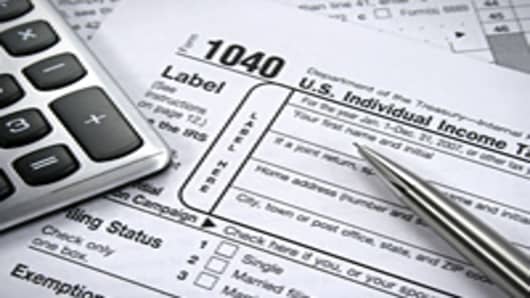Larger tax bills are coming for higher-income Americans, if President Obama has his way.
For individuals making $200,000 and up and couples making $250,000 or more a year, they will see their taxes increase in 2011, unless Congress votes to keep the George W. Bush era cuts in place.
In his budget released Monday, Obama said he wanted to let the Bush cuts sunset at the end of 2010, as they are scheduled to do, in order to help cut the bulging deficit.
This would raise the top two income tax rates from 33 percent to 36 percent and from 35 percent to 39.6 percent. The government would reportedly take in $365 billion over the next decade from those increases.
While there's a lot of uncertainty over Obama's budget in Congress, experts say it's pretty clear that the Bush tax cuts will be ending.
"I don't see the Republicans putting up much of a fight to keep the cuts," says Bridget Crawford, professor of law at Pace University. "Obama will be accused of being a big spender but he's just rolling back what was temporary anyway."
Temporary or not, those getting hit by the taxes are not going to like it much, says Ted Lanzaro, a CPA in Connecticut who runs his own accounting firm.
"It's almost crazy to say that people in the higher income levels can't afford it, but paying more taxes at any level is not fun," says Lanzaro. "People ask 'who am I working for, me or the government?' Besides, living in a big city like New York is not cheap, even at the higher income levels."
How much would the tax increase be? That depends on the paycheck—more income means higher taxes.
For example, a couple filing a joint married return that made $250,000 would pay roughly $60,200 this year in federal taxes. Next year, it would go up to about $61,150. For a couple making $400,000 a year, they would pay roughly $76,000 in taxes in 2010 but pay around $78,800 in 2011—an increase of $1,800.
Besides the tax increase on higher incomes, Obama's budget plan for 2011 calls for:
—A limit on the itemized tax deductions high earners can claim for charitable donations, mortgage interest and state and local taxes. Taxpayers in the highest brackets would only be able to deduct 28 percent of those items, instead of a percentage equal to their top marginal tax rate.
—An increase in the top capital gains tax rate from 15 percent to 20 percent for families making more than $250,000 a year and individuals making more than $200,000.
Taxpayers are already facing a problem this year—the Alternative Minimum Tax, or AMT. Those subject to the tax will fall to $45,000 for couples filing jointly this year and $35,750 for single filers.
Both sides of the political aisle have said they would take up the issue of adjusting the AMT to inflation. However, that has yet to happen
But if the Bush tax cuts end, they might actually help some of those caught in the AMT trap says Lanzaro.
"Depending on where you live, and the higher tax rates go, the less the AMT would effect them," says Lanzaro. "The AMT is triggered most often by higher property and state income taxes, not Federal taxes. It could pretty much just even out."
Lower incomes do see some tax cuts in Obama's budget. His plan would extend the Making Work Pay tax credit — $400 for individuals, $800 for a couple filing jointly — through 2011. And he would extend Bush-era tax cuts for families and individuals making less than $200,000.
But in the end, Obama would increase taxes on some businesses and wealthy individuals by a total of about $1.4 trillion over the next decade, starting in 2011.
For tax payers in the higher income brackets, having a good financial advisor might help deal with the increases.
"Those who can afford to get tax advice are usually able to keep their tax bills lower," says Pace University's Crawford. "But for a lot of people in expensive areas, $250,000 is not living high off the hog. No one likes paying more taxes even with a bigger paycheck."
For those targeted by Obama, it may come down to just accepting the inevitable.
"At the end of the day, the tax increases are coming," says Mark Zandi, chief economist at Moody's. "People in the higher incomes are just going to have to get used to the idea."



